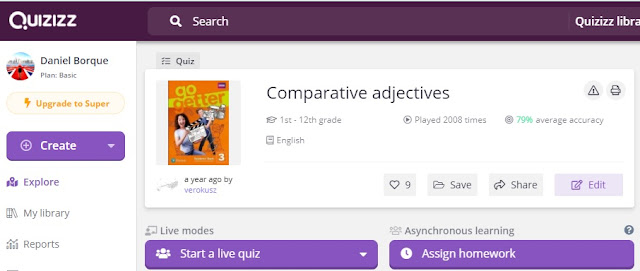EN
AMARILLO LOS CONTENIDOS POSTERIORES
DESCRIBE YOURSELF AND YOUR FAMILY.
1.
What’s your name?
-My name is Albert.
2.
Where are you from?
-I’m from Tenerife,
from the north, from Icod de los Vinos.
3.
Where do you live?
-I live in Buenavista,
in the north of the island.
4.
Can you speak English?
-Yes, I can speak a
little English, I’m learning at the moment.
5.
Can you play a musical
instrument?
-No, I can’t. But I
would like to play the guitar. / Yes, I can play the piano very well.
6.
Do you have any
brothers or sisters?
-Yes, I do, I have two
brothers and one sister.
7.
Are they older than
you?
-Well, my brothers are
older than me, but my sister is younger than me.
8.
What are your parents’
names?
-My parents’ names are
David and Silvia.
9.
Is your dad older than
your mum?
-Yes, he is. He is /
was five years older than my mum.
10.
Do you love your
family?
-It depends, I love my
parents, I adore them, but I don’t like my brother in law.
-Yes I do, I love them.
But we sometimes argue.
11.
Can you describe a
person in your family?
-Sure, of course. I’m
going to speak about my sister Blanca. She is …
WHAT DO YOU DO?
DESCRIBE YOUR DAILY ROUTINE.
1.
Are you an architect?
-No, I’m not, I’m a …
teacher/housewife/celebrity/singer/
2.
What time do you get up
in the morning?
-Well, it depends, I
usually get up at quarter past seven. However, on Sundays I get up a bit later,
at ten o’clock.
3.
What do you usually do
after breakfast?
-After breakfast, I
usually have a shower/go to class/go for a walk/brush my teeth/go shopping.
4.
What time do you have
lunch?
-I have lunch at around
two o’clock/ at quarter to three…
5.
What food do you
prefer, sweet or savoury?
-I prefer sweet food
because it is delicious! But I also like savoury food. / It depends, because I
like sweet food, for example, biscuits and chocolate but I like fish and chips,
too.
6.
How often do you eat
fast food?
-I never eat fast food.
/ I eat fast food twice /three times a week/
7.
How often do you cook
at home?
-I always cook at home
/ I sometimes cook at home. / I cook at home every day.
8.
How often are you late?
-I am never late. / I
am always late. / I am sometimes late.
9.
How often do you play
sports?
-I sometimes play
football. / I play football twice a week / I go swimming
-I never play sports.
10.
How often do you go
to the cinema?
-I go to the cinema
once a month because it’s very expensive. However, it’s cheaper on Wednesdays.
/ I sometimes go to the cinema. / I don’t go to the cinema very often, because
it’s…
EXTRA QUESTIONS
1.
What date is it today?
-Today is Thursday, the
tenth of May two thousand and nineteen.
2.
The north of the island
is better than the south, do you think so?
-Yes, I think so. I
think the north is better than the south. However, the south has better
beaches. / No, I don’t think so… (sáuz)
3.
What’s the weather like
in the north of Tenerife? And in the south?
-In the north the
weather is cool, cloudy and rainy. However, the weather in the south is dry,
hot and sunny. The north is colder than the south. The south is hotter than the
north.
4.
El Puma is younger
than Enrique Iglesias, is that right?
No, it isn’t right.
Enrique is a lot younger than El Puma. El Puma is a lot older than Enrique.
5.
The ‘Drago Milenario’
is the oldest tree in Tenerife, do you agree?
-Yes, I do, I agree.
It is the oldest tree in Tenerife.
6.
What is the highest
(ha-yest) mountain in Spain?
-The highest mountain
in Spain is mount Teide.
7.
Is mount Everest
higher or shorter than mount Teide?
-Mount Everest is
higher (ha-ya) than mount Teide. Mount Teide is shorter (shoo-ta)
8.
How many bedrooms are
there in your house?
-In my house there
are three bedrooms.
9.
How many bathrooms
are there in your house?
-There are
two/three/four bathrooms / There is only one bathroom.
10.
Is there a television
in your living room?
-Yes, there is a TV
in my living room.
11.
Is there a swimming
pool in your garden?
-No, there isn’t a
“swimming pool” in my garden.
12.
Can you afford a very
big house with a swimming pool?
-No, I can’t afford a
very big house with a swimming pool because it’s very expensive and I can’t
swim.
13.
How much is an
espresso in Icod? Is it cheaper or more expensive than in London?
-An espresso in Icod
costs/is 80 cents/one euro (yúrou). It is cheaper than in London. London is a
lot more expensive than Icod.
14.
How much sugar do you
like in your coffee? A lot of sugar or a little sugar?
-I like a little
sugar in my coffee. I don’t like any sugar in my coffe. I prefer coffee without
any sugar.
15.
How many cups of
coffee do you drink a day?
-I usually drink
between three and four cups of coffee a day.
16.
Have you visited La Gomera?
-Yes, I have. I
visited La Gomera last summer.
17.
Did you enjoy it?
-Yes, I did. I
enjoyed it a lot.
18.
How many islands have
you visited?
-I have visited three
of them.
19.
How much English have
you learnt?
-I have learnt a lot
of English/a little English.
20.
Have you enjoyed the
course?
-Yes, I have. I love
my classmates!









